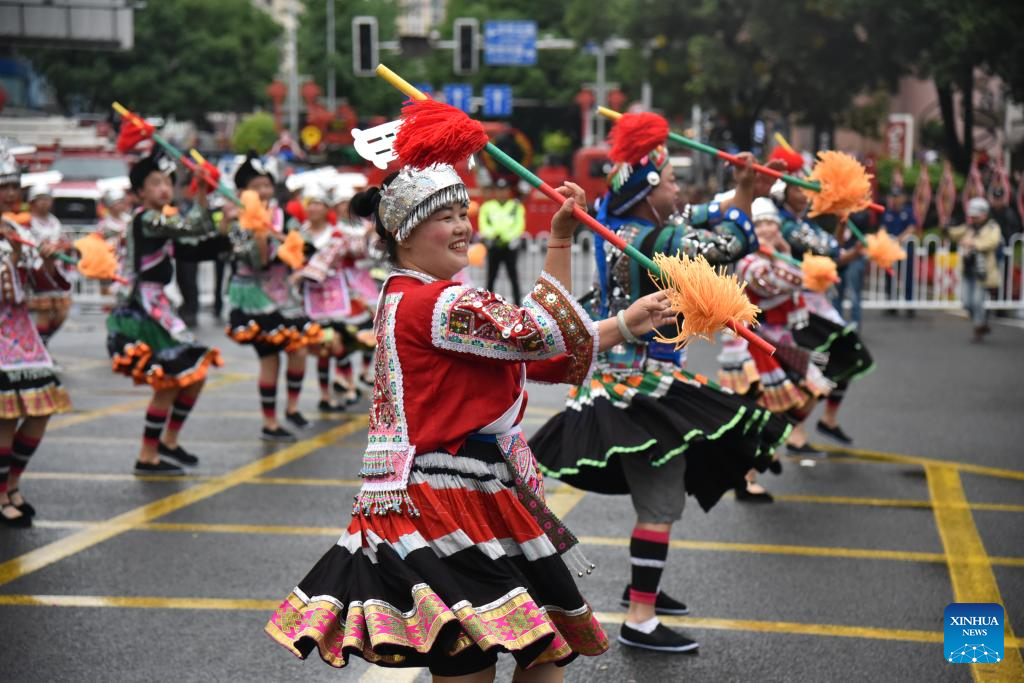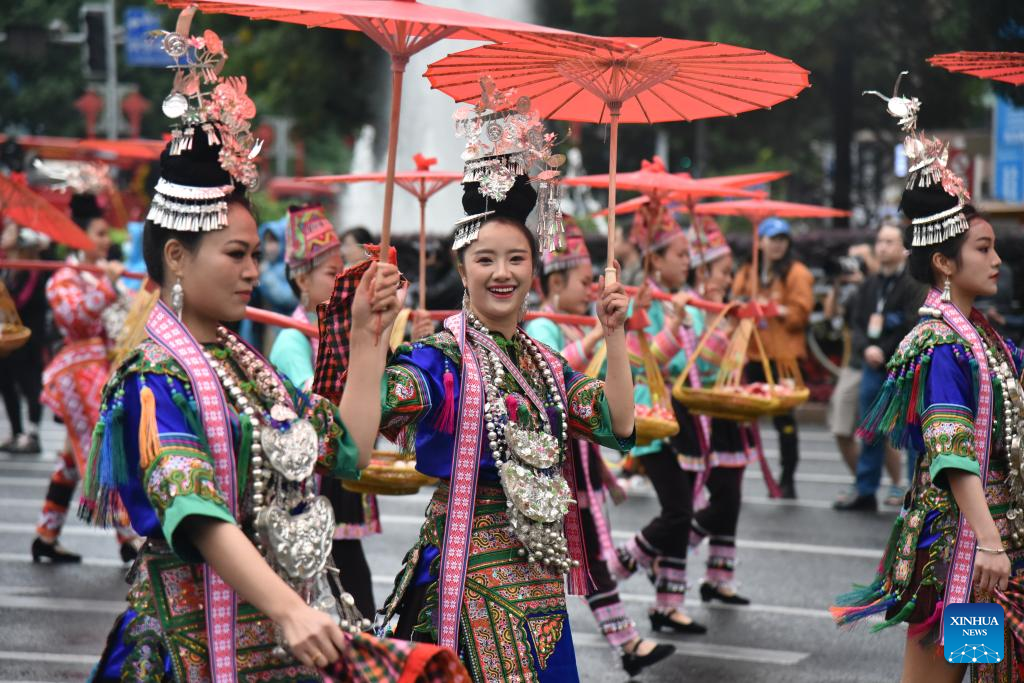
People dressed in ethnic costumes attend a cultural carnival in Guiyang, southwest China's Guizhou Province, May 18, 2024. (Xinhua/Luo Fei)
GUIYANG, May 20 (Xinhua) -- Moved by the cheerful rhythm of a song and dressed in her own ethnic costume, Chen Chuanqian, along with many others from different ethnic groups, sang and danced in Guiyang, capital of southwest China's Guizhou Province.
At 9:30 a.m. on Saturday, thousands of ethnic minority people from all over Guizhou gathered and paraded in Guiyang.
Although soft rain fell from time to time, people's enthusiasm to participate was not at all dampened. Both sides of the main parade road running from Zhonghua North Road towards the fountain were swarming with people, who were cheering and shouting in excitement.
Ethnic minority people dressed in different ethnic costumes assembled on a parade square, blowing a traditional musical instrument known as a Lusheng, banging gongs and drums, singing and dancing, and creating a unique "ethnic carnival" for tens of thousands of spectators along the route followed by the parade.
Chen, aged 23, from the city of Bijie in Guizhou Province, performed in the "Flower Sea Bijie" section of the carnival. Most performers in this section came from Nayong County, Hezhang County, and Weining County, and were Yi and Miao people. They demonstrated the Yi bell dance, Miao rolling beads and other forms of intangible cultural heritage.
Zhu Shengji, aged 10, participated in the Miao rolling beads performance. This is one of the Lusheng dances handed down from generation to generation by the "Little Flower Miao," a branch of the Miao ethnic group living in Nayong County and a few other places. The Miao rolling beads performance combines Lusheng playing, dance and acrobatics.
While playing the Lusheng, Zhu and his buddies also tumbled and even performed difficult lifting maneuvers, and despite a somewhat slippery road, they performed well and won applause from the crowd.
There are several children of about the same age as Zhu in the Nayong County rolling beads art troupe. "Over the years, the county has vigorously promoted ethnic culture in schools, and more and more people are learning the rolling beads," said Yang Yanrong, who is the performance instructor.
Yang added that the rolling bead performance was this year taken to the provincial capital to give more people a better understanding of the culture and art of "Little Flower Miao," which is very meaningful.
The parade route stretched over 2 kilometers in the central urban area of Guiyang and served as a "mobile grand stage" for showcasing diverse ethnic cultures.
Hu Xiaohua, a resident of Guiyang who was at the front of the crowd, arrived at the fountain as early as 8 a.m. While recording the grand parade by using her phone, she also sang along loudly as the music played. "I'm 56 years old this year. Seeing such a grand event in the central urban area, I'm particularly impressed," she said.
Hu added that this parade had assembled distinctive ethnic cultures from across the province, providing everyone in attendance with a colorful feast of ethnic cultures.
Located in the southwest of China, Guizhou Province is abundant in tourism resources, featuring attractive natural ecology and rich ethnic customs. Guizhou boasts internationally renowned sites such as Huangguoshu Waterfall and Libo Seven Small Arches, as well as diverse forms of ethnic intangible cultural heritage.
The grand parade celebration held in Guiyang was a part of the countdown city relay for Chinese Tourism Day, which falls on a Sunday this year and is organized by the Ministry of Culture and Tourism.
Carnival director Tang Huang explained that this event, themed around ethnic unity and collective celebration, not only focused on showcasing the colorful ethnic cultures of Guizhou, but also aimed to let more people see the new open, confident, and vibrant side of Guizhou.
Tu Yuanyuan, a dance teacher at Guizhou University, participated in a fusion of ethnic songs, dances and motorcycles. This parade involved 100 cool motorcycles moving in neat rows while carrying girls dressed in Miao costumes, drawing much attention in the process.
"This kind of fusion of ethnicity and fashion not only allows everyone to see different forms of presentation of ethnic culture but also aims to showcase the youthful and vibrant spirit of ethnic minorities," Tu said. ■

People dressed in ethnic costumes attend a cultural carnival in Guiyang, southwest China's Guizhou Province, May 18, 2024. (Xinhua/Luo Fei)



